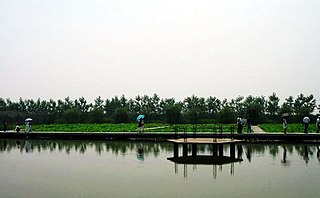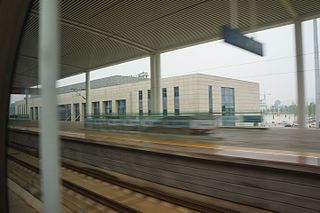Related Research Articles

Jiangsu is an eastern coastal province of the People's Republic of China. It is one of the leading provinces in finance, education, technology, and tourism, with its capital in Nanjing. Jiangsu is the third smallest, but the fifth most populous and the most densely populated of the 23 provinces of the People's Republic of China. Jiangsu has the highest GDP per capita and second-highest GDP of Chinese provinces, after Guangdong. Jiangsu borders Shandong in the north, Anhui to the west, and Zhejiang and Shanghai to the south. Jiangsu has a coastline of over 1,000 kilometers (620 mi) along the Yellow Sea, and the Yangtze River passes through the southern part of the province.

Suzhou, alternately romanized as Soochow, is a major prefecture-level city in Jiangsu province, China. As part of the Yangtze Delta megalopolis, it is a major economic center and focal point of trade and commerce.

The Beijing–Taipei Expressway, designated as G3 and commonly known as the Jingtai Expressway, is a partially completed Chinese expressway that, if fully constructed, would connect the People's Republic of China with Taiwan. Currently, the expressway is complete from Beijing to Fuzhou, Fujian, and is fully complete in Mainland China except for a small section in Fujian which is under construction.

Suzhou, formerly romanized as Suchow, is a prefecture-level city in northern Anhui, China. The city straddles the Tuohe and Xinbian rivers, which fork at its western end. The Tuohe was formerly a left tributary of the Huai River, while the latter is a modern artificial canal, but now both drain into Hongze Lake. It borders the prefectural cities of Huaibei and Bengbu to the southwest and south respectively, and the provinces of Jiangsu to the east, Shandong to the north, and Henan to the northwest.
Suzhou, Jiangsu (江苏苏州), is a prefecture-level city of Jiangsu Province, China.
Taihu Wu (吳語太湖片) or Northern Wu (北部吳語) is a Wu Chinese language spoken in much of the southern part of the province of Jiangsu, including Suzhou, Wuxi, Changzhou, the southern part of Nantong, Jingjiang and Danyang; the municipality of Shanghai; and the northern part of Zhejiang province, including Hangzhou, Shaoxing, Ningbo, Huzhou, and Jiaxing. A notable exception is the dialect of the town of Jinxiang, which is a linguistic exclave of Taihu Wu in Zhenan Min-speaking Cangnan county of Wenzhou prefecture in Zhejiang province. Speakers in regions around Taihu Lake and Hangzhou Bay, are the largest population among all Wu speakers. Taihu Wu dialects such as Shanghainese, Shaoxing and Ningbo are mutually intelligible even for L2 Taihu speakers.
Xiao County or Xiaoxian is a county in the north of Anhui Province, China, bordering the provinces of Jiangsu to the north and northeast and Henan to the west. It is under the administration of the prefecture-level city of Suzhou. It was formerly part of Jiangsu province, under the administration of Xuzhou. It became part of Anhui province in 1950.

Sihong County is under the administration of Suqian, Jiangsu province, China. It borders the prefecture-level cities of Huai'an to the southeast, Chuzhou (Anhui) to the south, Bengbu (Anhui) to the west, and Suzhou (Anhui) to the northwest.
Fuyang Prison is a prison in Fuyang, Anhui, China. It was established in 1971. It is a mid-size enterprise that works across a variety of industries, including fabric manufacturing, machine processing, and clothing manufacturing.
Jiucheng Administration Branch is a prison in Wangjiang County, Anhui, China established in 1957. It is one of the province's 2 largest agricultural prisons. It is located on the borders of Wangjiang and Susong Counties covering an area of 54,000 square kilometres (21,000 sq mi) and employing over 2000 guards. It controls 5 large-scale prisons including Bohu, Dongjiaohu, Menghu, Huanghu, and Majiahu. In 2002, the prison shifted from agriculture to the service industry. In 2005 it housed roughly 5,000 inmates whose labor is used to produce clothing, wool sweaters for export, to work with silver paper processing, and to continue with agricultural production. Inmates are forced to work up to 16 hours a day.
Jiulong Prison is a prison in Jiulong, Anhui, China. It is set in 120 acres (0.49 km2). During the 1983 "Strike Hard" campaign the prison managed the Woyang County Cement Factory under the Fuyang Area Bureau of Justice. In 1995, its name was changed to Fuyang City Longshan Prison. On August 26, 2004, after Fuyang and Haozhou were divided into separate administrative areas it moved from Longshan town, Woyang County to its present location and changed to its present name. It holds inmates serving sentences of 5 years or less from Fuyang's 5 counties and 3 districts.
Lujiang Prison is a prison in Chaohu City, Anhui, China established in 1957, with an area of 987mu. It is a high security prison for serious offenders, currently employing over 1,600 inmates. The prison is one of China's largest national valve manufacturers that produces standard valves. In 1997, it received (DNV)ISO9002 quality system authentication via Norwegian Classification Society. In 1998, it had large shares of stock in Shanghai East China Valve Ltd. In 1998, the prison received Anhui Province prize for quality control. Lujiang Changtai Machine Works was approved by the State Economic and Trade Commission to manage valve factory's imports and exports. Products are exported to other countries including Britain and the US. Several valves are best-selling in over 60 countries and regions, including the US, Japan, Britain, France, and Germany.
Ma'anshan Prison is a prison in Ma'anshan, Anhui, China. It was established in 1964. Formerly known as the Ma'anshan Pipe-casting Works. With funding from the City Metallurgy and Building Materials Bureau, the Magang General Company and the Prov. Ma'anshan Trust jointly managed the creation of the Magang Julong Company. In August 2006 began building a new construction that will hold 3000 inmates, 540 People's Police, and will cover an area of 400.46mu. It will be a high-security, medium-sized prison.
Qingshan Prison is a prison in Chaohu City, Anhui, China established in 1972. Originally Prov. No. 3 LRD, or Baihu Farm. In 1992, organization status changed to 'prison.' Has an area of 67.8 square meters, employs 225 guards, and 80% of the prisoners are severe criminals. The prison produces and assembles electric components, makes wool sweaters, and processes gemstones.
Wuhu Prison is a prison in Wuhu, Anhui, China, established in 1905, named in 1915 and renamed Prov. No. 1 Prison in 1949. In the 1970s, its male inmates were moved to Fuyang City and female inmates to the Suzhou Women's Prison. It then became a juvenile offender detachment that includes a cotton mill and produces metal parts.

The Suzhou East railway station is a high-speed railway station in Suzhou, Anhui, People's Republic of China. It is served by the Jinghu High-Speed Railway.

The Shanghai–Chengdu Expressway, designated as G42 and commonly referred to as the Hurong Expressway is an east–west bound expressway that connects the eastern metropolis of Shanghai to Chengdu, the capital city of Sichuan. The expressway passes through six provinces and serves major cities such as Suzhou, Wuxi, Changzhou, Nanjing, Hefei, Wuhan, and Yichang. The eastern terminus of G42 is at the Wuning Road Interchange of Shanghai Middle Ring Road. At its western terminus, the expressway intersects the East 3rd Ring Road and connects East Erxianqiao Road in Chenghua District, Chengdu. The expressway spans 1,960 km (1,220 mi) in length.
Wang Min is a former politician of the People's Republic of China. He successively served as Communist Party Secretary of Liaoning province, Party Secretary and Governor of Jilin province, and Vice Governor of Jiangsu province. Once considered a promising future leader in the Communist Party, Wang retired from his provincial leadership positions in 2015, before coming under investigation for corruption in 2016. He was sentenced to life in prison upon being convicted on charges of bribery and dereliction of duty.
Yanjing Beer 2015 Chinese FA Cup was the 17th edition of Chinese FA Cup.
Soochow University or Suzhou University may refer to:
References
- ↑ "Archived copy" (PDF). Archived from the original (PDF) on 2012-02-28. Retrieved 2009-12-10.
{{cite web}}: CS1 maint: archived copy as title (link)
- Laogai Research Foundation Handbook Archived 2012-02-28 at the Wayback Machine